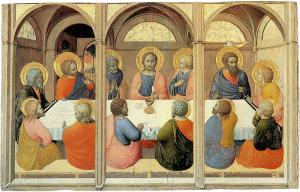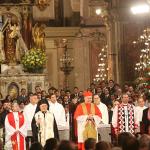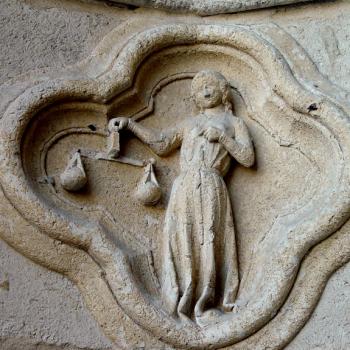
In the eucharist, Christ presents himself fully to his followers so that they can partake of him in such a way he becomes a part of them and they become a part of him. As they become a part of him, they also become a part of each other, as they find themselves to be one with each other through their unity with Christ. The liturgy is meant, in part, to help them realize their unity, to realize, that is, communion, in all its meanings. Receiving the eucharist is not meant to be some individualistic experience, where the person comes to Christ one on one, cut off from everyone and everything else. Rather, the eucharist is meant to draw people out of themselves so that they can commune with each other in love, and through that love, begin to incorporate everything about themselves, from what happened before their reception of the eucharist, to what happens after, into that moment of communion. They are meant to transform their relationships with others, and their relationships to creation as a whole, as they allow themselves to be drawn into the body of Christ, and through it, find themselves joining in with his eschatological work. They should help others experience the kingdom of God and to do that, they are to take they have received and share them with the world, helping to transform it from within so that in the end, the world finds its proper place in the kingdom of God.
Therefore, when we come to the eucharistic table, we should open ourselves up to accept our proper place in the body of Christ so that we can then share in the Spirit of Christ, the Holy Spirit, the Spirit of Love. We find ourselves becoming one with the incarnate Logos who entered the world to show God’s love to it, saving it from within instead of having it condemned. The more individualistic we are, the more we try to think of the eucharist and its reception in some sort of individualistic fashion, that is, as some sort of exclusive gift given to us due to our worthiness, the less open we are to Christ and the way he comes to us and reveals himself to us in communion. True worthiness for communion is had by coming to it in the spirit of love. Therefore, as Fr. George Maloney tells us, we properly celebrate the eucharist, and with it, the life, death and resurrection of Christ, by dying to ourselves, overcoming all sense of individualistic entitlement:
We cannot truly celebrate the death and resurrection of Christ in the Liturgy unless we move away from our own individualistic absorption to enter into the very mind of Christ. “Do this as a remembrance of me” (Lk 22:19) is a command of Christ to recall what He did, what He always is doing in liturgical time, and to do this in His presence and power. The celebration of Mass is, therefore, the action of Christ and His people, each taking his/her appointed place and role in His Body, being of one heart and mind with Christ as victim and offeror.[1]
We are to die to the self, to move beyond our false conception of who we are, that is, the belief that we are individuals cut off from each other; we are to stop living in ways bound by sin, bound, that is, by unlove. When we do this, we are ready to receive Christ in the way he wants to be received. We are not seizing him in the eucharist for the sake our own selfish gain, but rather, we come to receive so we can share Christ’s gifts with others, acting out of love, and through such love, we find ourselves coming together and becoming one with each other:
The resemblance to the teaching on love is fitting: each of the parts of the body is useful not for itself alone; rather, it brings benefit to the body as a whole. Accordingly, it likewise behooves people receiving some grace from on high to acknowledge clearly that they received this gift for the common good; the believers form one body, while each of us discharges the function of a limb.[2]
The eucharist is not intended to be treated as some sort of private good which we jealousy guard for ourselves; rather, it is given for the common good of all Christians (indeed, of all humanity). We should desire others to join in with us and receive what we have received, hoping to bring others into communion with us. Of course, we are to do this, not by force or compulsion, but by attracting others to Christ by the way we love each other and the world around us. The more we act on Christ’s teachings of love, the more we become like Christ and act like him, the more we will take on the role of the Good Samaritan, helping to heal the world in the way Christ first did:
This charity, however, reckons all men as neighbours. For on that account the Saviour rebuked someone, who thought that the obligation to behave neighbourly did not apply to a righteous soul in regard to one who was sunk in wickedness; and for that same reason He made up the parable that tells how a certain man fell among robbers, as he was going down from Jerusalem to Jericho, and blames the priest and the Levite, who passed by when they saw the man half-dead, but approves the Samaritan who showed mercy. [3]
The eucharist, therefore, is bound and connected by love, and in a way, the Divine liturgy is meant to be a representation of a greater liturgy, the liturgy of life. We are meant to take the lessons and spirit of the eucharistic liturgy and embrace it in all that we should do. We are to live our lives with selfless love, engaging and embracing others out of that love. When we do so, we will find all that we have done then is collected together and brought to fulfillment in the eschaton, in the eternal liturgy which knows no sorrow, nor no end, where all the world will come together in one glorious communion of love.
[1] George A. Maloney, SJ, Communion of Saints (Hauppauge, NY: Living Flame Press, 1988), 134.
[2] Theodoret of Cyrus, Commentary on the Letters of St. Paul. Volume One. Trans. Robert Charles Hill (Brookline, MA: Holy Cross Orthodox Press, 2001), 119 [Romans].
[3] Origen, “The Song of Songs: Commentary” in Origen: The Song of Songs, Commentary And Homilies. Trans. R.P. Lawson (New York: Newman Press, 1956), 33-4.
Stay in touch! Like A Little Bit of Nothing on Facebook.
If you liked what you read, please consider sharing it with your friends and family!
N.B.: While I read comments to moderate them, I rarely respond to them. If I don’t respond to your comment directly, don’t assume I am unthankful for it. I appreciate it. But I want readers to feel free to ask questions, and hopefully, dialogue with each other. I have shared what I wanted to say, though some responses will get a brief reply by me, or, if I find it interesting and something I can engage fully, as the foundation for another post. I have had many posts inspired or improved upon thanks to my readers.













